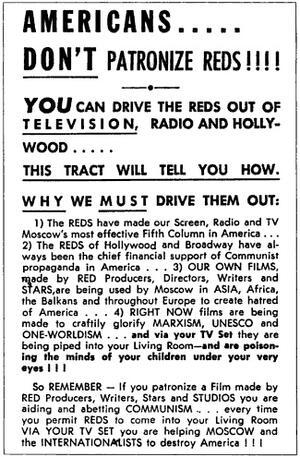Dr. Judith Rosenbaum Talks Living the Legacy with Jewschool
A black and white advertisement from the mid-1950's describing the dangers of supporting members of the Communist who work in the entertainment industry. By anonymous, via Wikimedia Commons.
This fall, the Jewish Women’s Archive released its latest online curriculum in the Living the Legacy series, a Jewish social justice education project that uses primary sources to explore the role of Jews in the Civil Rights Movement, and now, in the Labor Movement.
Chanel Dubofsky interviews Dr. Judith Rosenbaum, JWA's Director of Public History.
Q: Give us a glimpse into this particular curriculum and what it contains.
Judith Rosenbaum (JR): Two years ago, we released the curriculum on the Civil Rights movement. In it, we wanted to go beyond the often congratulatory manner of Jewish conversations about social justice and look more closely at the challenges regarding race and Jewish identity in the movement. The Labor curriculum is also primary source based, and adaptable for a variety of educational situations. It crosses different time periods and narratives and includes 14 biographies of labor leaders, as well as women’s stories in the labor movement, which are often excluded.
Q: What do you hope that folks will take from the curriculum? What conversations do you hope people will have as a result of it?
JR: In the United States, the conversation around labor has fallen apart. I hope this curriculum will help folks see parallels and create alliances, and start a different level of dialogue about dignity, identity, human rights, ethical treatment of workers; beyond the questions of whether or not unions are good or bad. We see things as a question of laborers v. professionals, or allies v. members, when actually, we’re all involved in the labor relationship, but most of us feel alienated from it, because we have a particular idea of what a worker is. Let’s reframe the issue around fair employment and create a fuller picture: What does it mean to be a worker? What are worker’s rights? What are my responsibilities to the labor relationships in which I am involved? Where does dignity fit in to our notions of what work is about?







